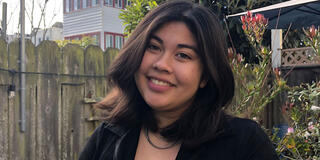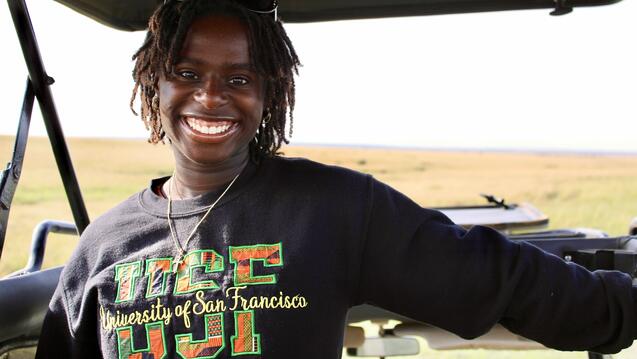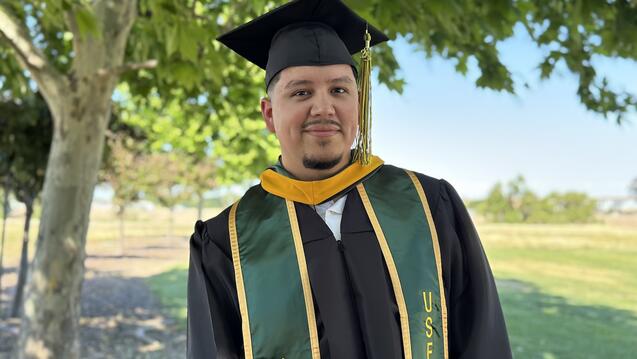Meet Estelle Petrocelli '24

The sociology student discusses their current internship at the United States Pretrial Services, advice for current USF students, and plans for the future.
Why USF?
I grew up in Santa Cruz, and we're right by San Francisco. So I grew up visiting not too often, but often enough, where I could always imagine myself eventually living in San Francisco, and USF was the perfect opportunity to actually live out that dream. But even beyond that, I love how diverse USF is. I wanted to go to school with mostly people of color as a person of color myself, and I wanted to also live in a social justice-minded university.
What made you choose sociology?
I actually knew immediately I wanted to be a sociology major because I took a sociology class in high school. So I've stuck with sociology my entire college career, but I added two minors, anthropology and legal studies.
What in particular do you like about sociology?
I think sociology is such a unique way of perceiving the world, and I think everyone should have a sociological perspective, like the analysis you take with everything. I mean, there's this joke in sociology where it's like, you can never enjoy movies anymore because everything we're always overthinking it. But I guess that’s just learning how to critically think. Everyone says philosophy teaches you how to critically think and that’s how I feel about sociology.
Have there been any classes that you've taken at USF, either in sociology or other classes, that you’ve really loved?
I took this one course with Professor [Hwaji] Shin, a sociology professor, called Critical Approaches to Race and Ethnicity. I loved that class. It really changed me fundamentally. It taught me how to be a better writer and a better thinker. And then I took this other class called Juvenile Justice that would also change my mind and really brought me a lot of literary knowledge and research paper-based knowledge that I needed.
Where are you interning now?
I work at the United States Pretrial Services of the Northern District of California. So like a lot of defendants before their case, there's a variety of circumstances they can be in and basically pretrial investigates what's the best way to protect both the clients and also the community that they are in. And so it's like figuring out if it’s safer or what's the best option for everyone. We're also trying to eliminate unnecessary detention because a lot of people in pretrial cases are, like, stuck in unnecessary detention. And so it's basically figuring out the best path for everyone.
Did you have any internships before this one, or is this your first one?
I currently work at the Speaking Center on campus.
What do you do there?
We help students with speeches, whether it's delivery — the way you present yourself — or the outline of the speech, because a lot of students struggle with this, outlining what they want to say, or visual aids. Since we're also students, we understand the struggles students face and the fears that surround it when going to speak.
Were there any classes or ways that USF prepared you for your internship?
Yes, I do have to write often; sociology is all about writing. In general, that field has helped me. I would say I'm a very extroverted, open, and sociable person, but the Speaking Center honed me in on how best to communicate with people that you have either nothing in common with or you have a lot in common with, no matter what. Finding that common ground to be able to speak, and also just going through job interviews, because there were multiple stages to getting this job, better prepared me because I'm much more of a comfortable speaker in general.
Has your internship at United States Pretrial Services enhanced what you're learning in the classroom?
It's definitely helped enhance the way I learn because I am in the real world, and it's different working in a job where most of the people are not my age. And I think it's helping me learn what I want to get out of my experience. It has shifted my lens a little bit because I'm often talking to people who I don't necessarily know, but who I want to know. And it's like bringing that into the classroom — understanding that is helping me, and hopefully the others around me, learn.
What do you want to do career wise? Has this internship inspired or maybe informed a path that you want to take in the future?
I definitely feel like part of the reason I took this was for legal studies, but also I want to peer into the legal view because I'm thinking of going to law school. The end goal is to become an immigration lawyer. That is something I have always thought about, because of my own connections, like my mom was an immigrant, and hearing her story really made me want to try and help others. I also have been playing with the idea of becoming a labor union lawyer as well. It's one of those two routes.
Is there any advice you would give to your fellow students who are looking for internships? Anything you wish you would have known before you started your first day as an intern?
For USF students, the best thing I can say is talk to your professors and make friends with them. There is a difference between a superficial way and just using them to network and getting to know them. But a lot of the people I interact with like [Program Assistant] Jamie Andon I love. I love her so much. And I love a lot of my professors. I talk to them, not like they're my friends, but we respect each other. And so I reach out to them if I need any help or it's like I need advice and they will reach back. It's the relationship you have with your professors that really does help you in your own growth, but also they will help you if you need any connections, too.
And then for the internship, everyone's going to be really nervous. But I think if someone told me, just relax, just be yourself, don't worry too much, it will be fine. Don't be afraid to talk to people because even though I've been working with them for months, I'm still nervous to talk to my coworkers. Moving past that awkward stage is really important.


